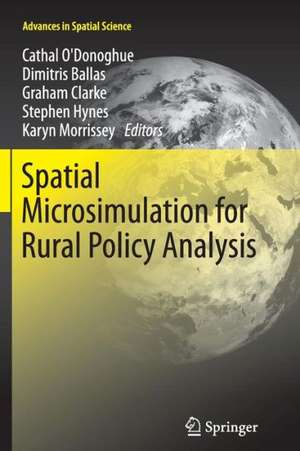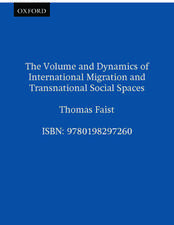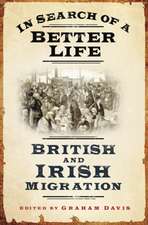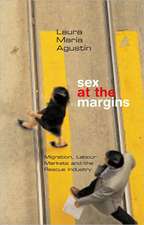Spatial Microsimulation for Rural Policy Analysis: Advances in Spatial Science
Editat de Cathal O'Donoghue, Dimitris Ballas, Graham Clarke, Stephen Hynes, Karyn Morrisseyen Limba Engleză Paperback – 9 noi 2014
| Toate formatele și edițiile | Preț | Express |
|---|---|---|
| Paperback (1) | 639.73 lei 6-8 săpt. | |
| Springer Berlin, Heidelberg – 9 noi 2014 | 639.73 lei 6-8 săpt. | |
| Hardback (1) | 645.96 lei 6-8 săpt. | |
| Springer Berlin, Heidelberg – 12 oct 2012 | 645.96 lei 6-8 săpt. |
Din seria Advances in Spatial Science
-
 Preț: 368.92 lei
Preț: 368.92 lei - 18%
 Preț: 963.47 lei
Preț: 963.47 lei - 18%
 Preț: 948.16 lei
Preț: 948.16 lei - 18%
 Preț: 947.67 lei
Preț: 947.67 lei - 18%
 Preț: 940.72 lei
Preț: 940.72 lei - 18%
 Preț: 954.45 lei
Preț: 954.45 lei - 15%
 Preț: 646.62 lei
Preț: 646.62 lei - 18%
 Preț: 959.50 lei
Preț: 959.50 lei - 18%
 Preț: 956.33 lei
Preț: 956.33 lei - 18%
 Preț: 949.23 lei
Preț: 949.23 lei - 15%
 Preț: 646.75 lei
Preț: 646.75 lei - 15%
 Preț: 643.99 lei
Preț: 643.99 lei - 18%
 Preț: 955.40 lei
Preț: 955.40 lei - 15%
 Preț: 643.00 lei
Preț: 643.00 lei - 15%
 Preț: 644.49 lei
Preț: 644.49 lei - 18%
 Preț: 953.35 lei
Preț: 953.35 lei - 18%
 Preț: 956.03 lei
Preț: 956.03 lei - 15%
 Preț: 647.27 lei
Preț: 647.27 lei - 15%
 Preț: 638.24 lei
Preț: 638.24 lei - 18%
 Preț: 961.23 lei
Preț: 961.23 lei - 18%
 Preț: 954.93 lei
Preț: 954.93 lei - 15%
 Preț: 643.48 lei
Preț: 643.48 lei - 18%
 Preț: 955.70 lei
Preț: 955.70 lei - 15%
 Preț: 650.86 lei
Preț: 650.86 lei - 15%
 Preț: 650.04 lei
Preț: 650.04 lei - 15%
 Preț: 648.42 lei
Preț: 648.42 lei - 18%
 Preț: 949.42 lei
Preț: 949.42 lei - 18%
 Preț: 960.30 lei
Preț: 960.30 lei - 18%
 Preț: 948.29 lei
Preț: 948.29 lei - 18%
 Preț: 958.07 lei
Preț: 958.07 lei - 18%
 Preț: 950.66 lei
Preț: 950.66 lei - 18%
 Preț: 956.03 lei
Preț: 956.03 lei - 15%
 Preț: 643.65 lei
Preț: 643.65 lei - 18%
 Preț: 956.99 lei
Preț: 956.99 lei - 18%
 Preț: 956.81 lei
Preț: 956.81 lei - 18%
 Preț: 958.73 lei
Preț: 958.73 lei - 18%
 Preț: 959.98 lei
Preț: 959.98 lei - 18%
 Preț: 952.40 lei
Preț: 952.40 lei - 15%
 Preț: 643.00 lei
Preț: 643.00 lei
Preț: 639.73 lei
Preț vechi: 752.63 lei
-15% Nou
Puncte Express: 960
Preț estimativ în valută:
122.43€ • 132.94$ • 102.84£
122.43€ • 132.94$ • 102.84£
Carte tipărită la comandă
Livrare economică 23 aprilie-07 mai
Preluare comenzi: 021 569.72.76
Specificații
ISBN-13: 9783642447365
ISBN-10: 3642447368
Pagini: 280
Ilustrații: XVI, 264 p.
Dimensiuni: 155 x 235 x 15 mm
Greutate: 0.4 kg
Ediția:2013
Editura: Springer Berlin, Heidelberg
Colecția Springer
Seria Advances in Spatial Science
Locul publicării:Berlin, Heidelberg, Germany
ISBN-10: 3642447368
Pagini: 280
Ilustrații: XVI, 264 p.
Dimensiuni: 155 x 235 x 15 mm
Greutate: 0.4 kg
Ediția:2013
Editura: Springer Berlin, Heidelberg
Colecția Springer
Seria Advances in Spatial Science
Locul publicării:Berlin, Heidelberg, Germany
Public țintă
ResearchCuprins
1 Introduction.- 2 The Spatial Policy Context of Economic, Agricultural and Environmental Change in Rural Ireland.- 3 A Review of Microsimulation for Policy Analysis.- 4 The SMILE Model: Construction and Calibration.- 5 Validation Issues and the Spatial Pattern of Household Income.- 6 Farm Level Spatial Microsimulation Modelling.- 7 Conservation and Rural Environmental Protection Scheme.- 8 Modelling Greenhouse Gas Emissions from Agriculture.- 9 The Location Economics of Biomass Production for Electricity Generation.- 10 Modelling Farm Viability.- 11 The Spatial Distribution of Household Disposable Income.- 12 Spatial Access to Health Services.- 13 Modelling the Spatial Pattern of Rural Tourism and Recreation.- 14 Conclusions and Next Steps.
Notă biografică
Cathal O'Donoghue is Head of the Rural Economy Research Centre. He has studied at UCC, UCD, Oxford and the London School of Economics, taking degrees in Mathematics, Statistics, Economics and Social Policy. Prior to joining RERC Cathal spent a number of years at the Department of Economics at NUI Galway, Ireland. His research is mainly in the area of applied public economics, focusing on the impact of household sector, tax and social policy on poverty, inequality, work incentives and environmental pollution. In addition, this work has extended into labour economics, economic demography and environmental economics.
Dimitris Ballas is a Senior Lecturer in the Department of Geography at the University of Sheffield and Deputy Director of the University of Sheffield research Centre for Health and Well-being in Public Policy (CWiPP). He is an economist by training (1996, University of Macedonia, Thessaloniki, Greece) and also has a Master of Arts (with distinction) in Geographical Information Systems (1997, University of Leeds, UK) and a PhD in Geography (2001, University of Leeds, UK). He has extensive experience and expertise in the use of Geonformatics and GIS in the Social Sciences. His current research interests include economic geography, social and spatial inequalities, social justice, exploring geographies of happiness and well-being and socio-economic applications of GIS. He is the lead author of the book Geography matters: simulating the impacts of national social policies and a co-author of the books Post-Suburban Europe: Planning and Politics at the Margins of Europe's Capital Cities and Poverty, wealth and place in Britain, 1968 to 2005. He has also published his research widely in peer-reviewed international academic journals, peer-reviewed edited book chapters and conference papers.
Graham Clarke is Professor of Business Geography at the School of Geography, University of Leeds. He has workedextensively in GIS and applied spatial modelling, focusing on many applications within urban/social geography. A major research interest is spatial microsimulation, a technique for estimating ‘missing data’ and producing detailed household data sets for use in a wealth of social science simulations. The second major research area has been retail geography. Graham has been involved with strategic planning and management within the School of Geography, most notably as Head of School 1998-2001. Between 2003 and 2011 he was appointed Executive Director of the Regional Science Association International.
Stephen Hynes is a Senior Researcher and Head of the Socio-Economic Marine Research Unit at the National University of Ireland, Galway. He has previously worked as an environmental economist in the Rural Economy Research Centre, Teagasc and as a lecturer in Economics in the Department of Economics, NUI Galway. He has a B.Com., a M. Econ. Sc. and a Ph.D. (Economics) from the National University of Ireland, Galway and a Ph.D. (Environmental Economic) from the University of Stirling, Scotland. Stephen’s main research interest is in microeconomic behaviour analysis, related to marine/natural resource/environmental and rural development policy and his work has been published by a number of the top ranked journals in the fields of environmental and natural resource economics.
Karyn Morrissey is a lecturer in human geography in the School of Environmental Sciences, University of Liverpool. Her PhD entitled ‘Access to Health Care Services in Rural Ireland’ is from the School of Geography, University of Leeds. An economist (B.A. Economics and Sociology and Politics, National University of Ireland, Galway and MA in Economics and Social Policy and Planning, National University of Ireland, Galway) she specializes in computational methods, particularly spatial microsimulation and small area level analysis. Her current research focuses on health and health service provision, regional development, natural resource evaluation and cluster development.
Dimitris Ballas is a Senior Lecturer in the Department of Geography at the University of Sheffield and Deputy Director of the University of Sheffield research Centre for Health and Well-being in Public Policy (CWiPP). He is an economist by training (1996, University of Macedonia, Thessaloniki, Greece) and also has a Master of Arts (with distinction) in Geographical Information Systems (1997, University of Leeds, UK) and a PhD in Geography (2001, University of Leeds, UK). He has extensive experience and expertise in the use of Geonformatics and GIS in the Social Sciences. His current research interests include economic geography, social and spatial inequalities, social justice, exploring geographies of happiness and well-being and socio-economic applications of GIS. He is the lead author of the book Geography matters: simulating the impacts of national social policies and a co-author of the books Post-Suburban Europe: Planning and Politics at the Margins of Europe's Capital Cities and Poverty, wealth and place in Britain, 1968 to 2005. He has also published his research widely in peer-reviewed international academic journals, peer-reviewed edited book chapters and conference papers.
Graham Clarke is Professor of Business Geography at the School of Geography, University of Leeds. He has workedextensively in GIS and applied spatial modelling, focusing on many applications within urban/social geography. A major research interest is spatial microsimulation, a technique for estimating ‘missing data’ and producing detailed household data sets for use in a wealth of social science simulations. The second major research area has been retail geography. Graham has been involved with strategic planning and management within the School of Geography, most notably as Head of School 1998-2001. Between 2003 and 2011 he was appointed Executive Director of the Regional Science Association International.
Stephen Hynes is a Senior Researcher and Head of the Socio-Economic Marine Research Unit at the National University of Ireland, Galway. He has previously worked as an environmental economist in the Rural Economy Research Centre, Teagasc and as a lecturer in Economics in the Department of Economics, NUI Galway. He has a B.Com., a M. Econ. Sc. and a Ph.D. (Economics) from the National University of Ireland, Galway and a Ph.D. (Environmental Economic) from the University of Stirling, Scotland. Stephen’s main research interest is in microeconomic behaviour analysis, related to marine/natural resource/environmental and rural development policy and his work has been published by a number of the top ranked journals in the fields of environmental and natural resource economics.
Karyn Morrissey is a lecturer in human geography in the School of Environmental Sciences, University of Liverpool. Her PhD entitled ‘Access to Health Care Services in Rural Ireland’ is from the School of Geography, University of Leeds. An economist (B.A. Economics and Sociology and Politics, National University of Ireland, Galway and MA in Economics and Social Policy and Planning, National University of Ireland, Galway) she specializes in computational methods, particularly spatial microsimulation and small area level analysis. Her current research focuses on health and health service provision, regional development, natural resource evaluation and cluster development.
Textul de pe ultima copertă
The aim of this book is to explore the challenges facing rural communities and economies and to demonstrate the potential of spatial microsimulation for policy and analysis in a rural context.
This is done by providing a comprehensive overview of a particular spatial microsimulation model called SMILE (Simulation Model of the Irish Local Economy). The model has been developed over a ten year period for applied policy analyis in Ireland which is seen as an ideal study area given its large percentage of population living in rural areas.
The book reviews the policy context and the state of the art in spatial microsimulation against which SMILE was developed, describes in detail its model design and calibration, and presents example of outputs showing what new information the model provides using a spatial matching process.
The second part of the book explores a series of rural issues or problems, including the impacts of new or changing government or EU policies, and examines thecontribution that spatial microsimulation can provide in each area.
This is done by providing a comprehensive overview of a particular spatial microsimulation model called SMILE (Simulation Model of the Irish Local Economy). The model has been developed over a ten year period for applied policy analyis in Ireland which is seen as an ideal study area given its large percentage of population living in rural areas.
The book reviews the policy context and the state of the art in spatial microsimulation against which SMILE was developed, describes in detail its model design and calibration, and presents example of outputs showing what new information the model provides using a spatial matching process.
The second part of the book explores a series of rural issues or problems, including the impacts of new or changing government or EU policies, and examines thecontribution that spatial microsimulation can provide in each area.
Caracteristici
First book exploring the use of spatial microsimulation techniques for rural policy analysis A rare example of a model built and used by one agency for a variety of socio-economic applications A good example of a long lasting partnership between academic and a Government policy making agency and its products








